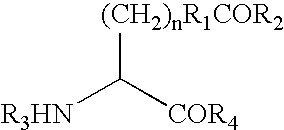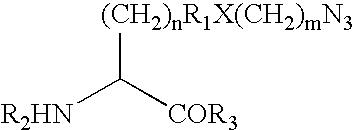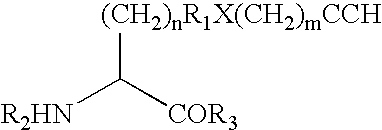Modified human growth hormone polypeptides and their uses
- Summary
- Abstract
- Description
- Claims
- Application Information
AI Technical Summary
Benefits of technology
Problems solved by technology
Method used
Image
Examples
example 1
[0543] This example describes one of the many potential sets of criteria for the selection of preferred sites of incorporation of non-naturally encoded amino acids into hGH.
[0544] This example demonstrates how preferred sites within the hGH polypeptide were selected for introduction of a non-naturally encoded amino acid. The crystal structure 3HHR, composed of hGH complexed with two molecules of the extracellular domain of receptor (hGHbp), was used to determine preferred positions into which one or more non-naturally encoded amino acids could be introduced. Other hGH structures (e.g. 1AXI) were utilized to examine potential variation of primary and secondary structural elements between crystal structure datasets. The coordinates for these structures are available from the Protein Data Bank (PDB) (Berstein et al. J. Mol. Biol. 1997, 112, pp 535) or via The Research Collaboratory for Structural Bioinformatics PDB available on the World Wide Web at rcsb.org. The structural model 3HHR...
example 2
[0552] This example details cloning and expression of a hGH polypeptide including a non-naturally encoded amino acid in E. coli. This example also describes one method to assess the biological activity of modified hGH polypeptides.
[0553] Methods for cloning hGH and fragments thereof are detailed in U.S. Pat. Nos. 4,601,980; 4,604,359; 4,634,677; 4,658,021; 4,898,830; 5,424,199; and 5,795,745, which are incorporated by reference herein. cDNA encoding the full length hGH or the mature form of hGH lacking the N-terminal signal sequence are shown in SEQ ID NO: 21 and SEQ ID NO: 22 respectively.
[0554] An introduced translation system that comprises an orthogonal tRNA (O-tRNA) and an orthogonal aminoacyl tRNA synthetase (O-RS) is used to express hGH containing a non-naturally encoded amino acid. The O-RS preferentially aminoacylates the O-tRNA with a non-naturally encoded amino acid. In turn the translation system inserts the non-naturally encoded amino acid into hGH, in response to an ...
example 3
[0560] This example details introduction of a carbonyl-containing amino acid and subsequent reaction with an aminooxy-containing PEG.
[0561] This Example demonstrates a method for the generation of a hGH polypeptide that incorporates a ketone-containing non-naturally encoded amino acid that is subsequently reacted with an aminooxy-containing PEG of approximately 5,000 MW. Each of the residues 35, 88, 91, 92, 94, 95, 99, 101, 103, 111, 120, 131, 133, 134, 135, 136, 139, 140, 143, 145, and 155 identified according to the criteria of Example 1 (hGH) is separately substituted with a non-naturally encoded amino acid having the following structure:
[0562] The sequences utilized for site-specific incorporation of p-acetyl-phenylalanine into hGH are SEQ ID NO: 2 (hGH), and SEQ ID NO: 4 (muttRNA, M. jannaschii mtRNACUATyr), and 16, 17 or 18 (TyrRS LW1, 5, or 6) described in Example 2 above.
[0563] Once modified, the hGH polypeptide variant comprising the carbonyl-containing amino acid is re...
PUM
| Property | Measurement | Unit |
|---|---|---|
| Atomic weight | aaaaa | aaaaa |
| Atomic weight | aaaaa | aaaaa |
| Atomic weight | aaaaa | aaaaa |
Abstract
Description
Claims
Application Information
 Login to View More
Login to View More - R&D
- Intellectual Property
- Life Sciences
- Materials
- Tech Scout
- Unparalleled Data Quality
- Higher Quality Content
- 60% Fewer Hallucinations
Browse by: Latest US Patents, China's latest patents, Technical Efficacy Thesaurus, Application Domain, Technology Topic, Popular Technical Reports.
© 2025 PatSnap. All rights reserved.Legal|Privacy policy|Modern Slavery Act Transparency Statement|Sitemap|About US| Contact US: help@patsnap.com



